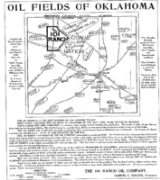
101 Ranch Oil Company
Encyclopedia
Founded in 1908 by oil exploration pioneer E. W. Marland
, The 101 Ranch Oil Company was located on the famous Miller Brothers 101 Ranch
and headquartered in Ponca City
, Oklahoma. The company’s 1911 oil discovery in North Eastern Oklahoma opened up oil development in a great region from Eastern Oklahoma west to Mervine, Newkirk, Blackwell, Billings and Garber and led to the founding of the Marland Oil Company
, later renamed the Continental Oil Company, Conoco.
, Pennsylvania on May 8, 1874. Marland studied to be an attorney, receiving an LL.B. from the University of Michigan
Law School
at the age of nineteen in 1893. Marland moved back to Pittsburgh and set up private practice. As an attorney representing local coal and oil interests, Marland became interested in geology
and by the age of 33, the young lawyer had become involved in a series of local coal and oil promotions which soon made him a small fortune.
Unfortunately for Marland, the millions he had amassed were lost following the panic of 1907. By 1908, Marland was broke and without a job.
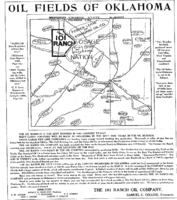 Interested in reestablishing his oil ventures, Marland came to Ponca City upon the urging of a relative, Lt. Franklin Roosevelt Kenney, who introduced Marland to the Miller brothers - Joseph "Joe" Carson Miller, Zachary "Zack" Taylor Miller and George Lee Kockernut Miller, of the famous 101 Ranch near Ponca City.
Interested in reestablishing his oil ventures, Marland came to Ponca City upon the urging of a relative, Lt. Franklin Roosevelt Kenney, who introduced Marland to the Miller brothers - Joseph "Joe" Carson Miller, Zachary "Zack" Taylor Miller and George Lee Kockernut Miller, of the famous 101 Ranch near Ponca City.
He decided that the Ranch surface geology indicated that there was oil in the area. Geology was his divining rod, he said, a science yet to be proven in the hunt for crude. Marland returned to Pittsburgh and raised $500,000 for a new oil venture, naming it the The 101 Ranch Oil Company with himself as President and taking into the company as directors, O. W. Ainslie, the chef at Pittsburgh's Boyer Hotel, J. G. McCaskey, a sauerkraut producer, Marland's relative, F. R. Kenney, a retired chair manufacturer, George Miller of the 101 Ranch, and Marland’s father-in-law, Samuel Collins who was also elected Treasurer.
, the “Sauerkraut King”, a wealthy investor and young Pittsburgh adulthood friend of Marland’s reorganized the Company. Elected President, McCaskey raised funds from Pittsburgh investors including W. H. McFadden
, a retired Carnegie Steel Company
executive and J. M. Weaver, a business associate of McCaskey’s. McFadden was elected Vice President and General Manager of the company and Weaver was elected Secretary and Treasurer. In 1911 Pittsburghers held the stock of the company. These were E. W. Marland, J. G. McCaskey, W. H. McFadden, G. W. Baum, N. A. Hemphill, Pittsburgh Alderman J. J. Kirby, J. M. Weaver, B. H. Gibson, C. L. Stevens, J. J. Kearns, and Marland's father-in-law Samuel C. Collins. Later, McCaskey appointed Lewis Haines Wentz
, an employee in his sauerkraut operation, Secretary of the company.
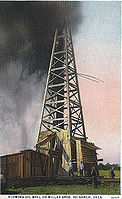 With new money, and using his practical knowledge of geology Marland choose a new well site at an elongated and isolated hill near Bodark Creek that he thought was a geological high as well as a topographic high. However, the hill Marland picked was a burial ground for the Ponca tribe. Actually the Ponca bound their dead, laid them upon scaffolds
With new money, and using his practical knowledge of geology Marland choose a new well site at an elongated and isolated hill near Bodark Creek that he thought was a geological high as well as a topographic high. However, the hill Marland picked was a burial ground for the Ponca tribe. Actually the Ponca bound their dead, laid them upon scaffolds
and wild animals devoured them. These scaffolds were on the crest of the hill in the exact location that Marland wanted to drill.
Marland and the Millers met with White Eagle
, Chief of the Ponca
and emerged with permission to drill off the crest of the hill on an allotment owned by the Ponca Indian, Willie-Cries. For a $1,000 annual payment and a 12.5% override, a lease was obtained from Willie-Cries, and on June 11, 1911, that well “Willie-Cries-For-War” struck oil and stayed in production until 1976, bringing wealth to the company and its investors. (1).
, later (January 3, 1921), incorporated in Delaware to acquire through an exchange of stock control of the Marland Refining Co. and Kay County Gas Co. Name changed to Continental Oil Company June 26, 1929, at which time it acquired for a consideration of 2,317,266 shares of stock, the assets (subject to liabilities) of Continental Oil Company , a Maine corporation, founded in 1875 as the Continental Oil and Transportation Company, based in Ogden, Utah, originally a coal, oil, kerosene, grease and candles distributor in the West.
E. W. Marland
Ernest Whitworth Marland was an American lawyer, oil businessman, and politician who served as the tenth Governor of Oklahoma.-Career as an Oilman:...
, The 101 Ranch Oil Company was located on the famous Miller Brothers 101 Ranch
Miller Brothers 101 Ranch
The Miller Brothers 101 Ranch was an cattle ranch in the Indian Territory of Oklahoma before statehood. Located near modern-day Ponca City, it was founded by Colonel George Washington Miller, a veteran of the Confederate Army, in 1893. The 101 Ranch was the birthplace of the 101 Ranch Wild West...
and headquartered in Ponca City
Ponca City, Oklahoma
Ponca City is a small city in Kay and Osage counties in the U.S. state of Oklahoma, which was named after the Ponca Tribe. Located in north central Oklahoma, it lies approximately south of the Kansas border, and approximately east of Interstate 35. 25,919 people called Ponca City home at the...
, Oklahoma. The company’s 1911 oil discovery in North Eastern Oklahoma opened up oil development in a great region from Eastern Oklahoma west to Mervine, Newkirk, Blackwell, Billings and Garber and led to the founding of the Marland Oil Company
Marland Oil Company
Marland Oil Company was an American oil company founded in 1917, by Ponca City, Oklahoma oil exploration pioneer E. W. Marland when he assembled his various holdings including the 101 Ranch Oil Company into one unit, forming Marland Oil Company...
, later renamed the Continental Oil Company, Conoco.
Background
Ernest Whitworth Marland was born in PittsburghPittsburgh, Pennsylvania
Pittsburgh is the second-largest city in the US Commonwealth of Pennsylvania and the county seat of Allegheny County. Regionally, it anchors the largest urban area of Appalachia and the Ohio River Valley, and nationally, it is the 22nd-largest urban area in the United States...
, Pennsylvania on May 8, 1874. Marland studied to be an attorney, receiving an LL.B. from the University of Michigan
University of Michigan
The University of Michigan is a public research university located in Ann Arbor, Michigan in the United States. It is the state's oldest university and the flagship campus of the University of Michigan...
Law School
Law school
A law school is an institution specializing in legal education.- Law degrees :- Canada :...
at the age of nineteen in 1893. Marland moved back to Pittsburgh and set up private practice. As an attorney representing local coal and oil interests, Marland became interested in geology
Geology
Geology is the science comprising the study of solid Earth, the rocks of which it is composed, and the processes by which it evolves. Geology gives insight into the history of the Earth, as it provides the primary evidence for plate tectonics, the evolutionary history of life, and past climates...
and by the age of 33, the young lawyer had become involved in a series of local coal and oil promotions which soon made him a small fortune.
Unfortunately for Marland, the millions he had amassed were lost following the panic of 1907. By 1908, Marland was broke and without a job.
Founding

He decided that the Ranch surface geology indicated that there was oil in the area. Geology was his divining rod, he said, a science yet to be proven in the hunt for crude. Marland returned to Pittsburgh and raised $500,000 for a new oil venture, naming it the The 101 Ranch Oil Company with himself as President and taking into the company as directors, O. W. Ainslie, the chef at Pittsburgh's Boyer Hotel, J. G. McCaskey, a sauerkraut producer, Marland's relative, F. R. Kenney, a retired chair manufacturer, George Miller of the 101 Ranch, and Marland’s father-in-law, Samuel Collins who was also elected Treasurer.
Drilling for oil
Upon his return to the ranch he began drilling. The first well located near the "White House", the ranch headquarters for the Miller brothers' 101 Ranch, was a 2,500 foot dry well. The next seven wells were uneconomic gas wells and by 1910 the company was on the verge of failure.Restructure
Then John G. McCaskeyJohn G. McCaskey
John Gruard McCaskey was an American oil businessman.-Early life:John Gruard McCaskey born in Pittsburgh, Pennsylvania on July 3, 1874, was an essential factor in opening up the oil fields of Oklahoma and Texas...
, the “Sauerkraut King”, a wealthy investor and young Pittsburgh adulthood friend of Marland’s reorganized the Company. Elected President, McCaskey raised funds from Pittsburgh investors including W. H. McFadden
W. H. McFadden
-Early life:William H. McFadden, born in Moundsville, West Virginia on June 11, 1869, was an essential factor in opening up the oil fields of Oklahoma...
, a retired Carnegie Steel Company
Carnegie Steel Company
Carnegie Steel Company was a steel producing company created by Andrew Carnegie to manage business at his steel mills in the Pittsburgh, Pennsylvania area in the late 19th century.-Creation:...
executive and J. M. Weaver, a business associate of McCaskey’s. McFadden was elected Vice President and General Manager of the company and Weaver was elected Secretary and Treasurer. In 1911 Pittsburghers held the stock of the company. These were E. W. Marland, J. G. McCaskey, W. H. McFadden, G. W. Baum, N. A. Hemphill, Pittsburgh Alderman J. J. Kirby, J. M. Weaver, B. H. Gibson, C. L. Stevens, J. J. Kearns, and Marland's father-in-law Samuel C. Collins. Later, McCaskey appointed Lewis Haines Wentz
Lewis Haines Wentz
Lewis Haines Wentz was an American oil businessman.-Early life:Lewis Haines Wentz, born in Tama, Iowa on November 10, 1877, was an essential factor in opening up the oil fields of Oklahoma...
, an employee in his sauerkraut operation, Secretary of the company.
Ponca lease

Burial tree
A burial tree or burial scaffold is a tree or simple structure used for supporting corpses or coffins. They were once common among the Balinese, the Naga people, certain Australian Aborigines, and some North American Indian groups....
and wild animals devoured them. These scaffolds were on the crest of the hill in the exact location that Marland wanted to drill.
Marland and the Millers met with White Eagle
White Eagle
White Eagle may refer to:A coat of arms:*White Eagle of the Serbian royal houses Nemanjić, Mrnjavčević, Lazarević, Crnojević, Obrenović and Karađorđević used on the Coat of arms of Serbia and the Flag of Serbia ....
, Chief of the Ponca
Ponca
The Ponca are a Native American people of the Dhegihan branch of the Siouan-language group. There are two federally recognized Ponca tribes: the Ponca Tribe of Nebraska and the Ponca Tribe of Indians of Oklahoma...
and emerged with permission to drill off the crest of the hill on an allotment owned by the Ponca Indian, Willie-Cries. For a $1,000 annual payment and a 12.5% override, a lease was obtained from Willie-Cries, and on June 11, 1911, that well “Willie-Cries-For-War” struck oil and stayed in production until 1976, bringing wealth to the company and its investors. (1).
Marland Oil Company and CONOCO
The main office was in Ponca City and the company stayed in operation until 1917 when it was sold for cash and stock in the Marland Oil CompanyMarland Oil Company
Marland Oil Company was an American oil company founded in 1917, by Ponca City, Oklahoma oil exploration pioneer E. W. Marland when he assembled his various holdings including the 101 Ranch Oil Company into one unit, forming Marland Oil Company...
, later (January 3, 1921), incorporated in Delaware to acquire through an exchange of stock control of the Marland Refining Co. and Kay County Gas Co. Name changed to Continental Oil Company June 26, 1929, at which time it acquired for a consideration of 2,317,266 shares of stock, the assets (subject to liabilities) of Continental Oil Company , a Maine corporation, founded in 1875 as the Continental Oil and Transportation Company, based in Ogden, Utah, originally a coal, oil, kerosene, grease and candles distributor in the West.
Images
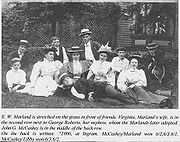 |
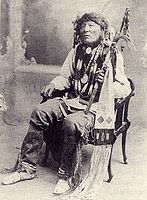 |
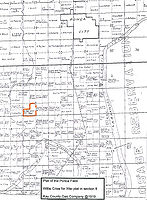 |
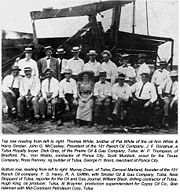 |
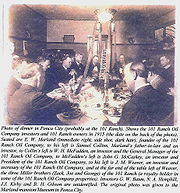 |
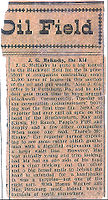 |

